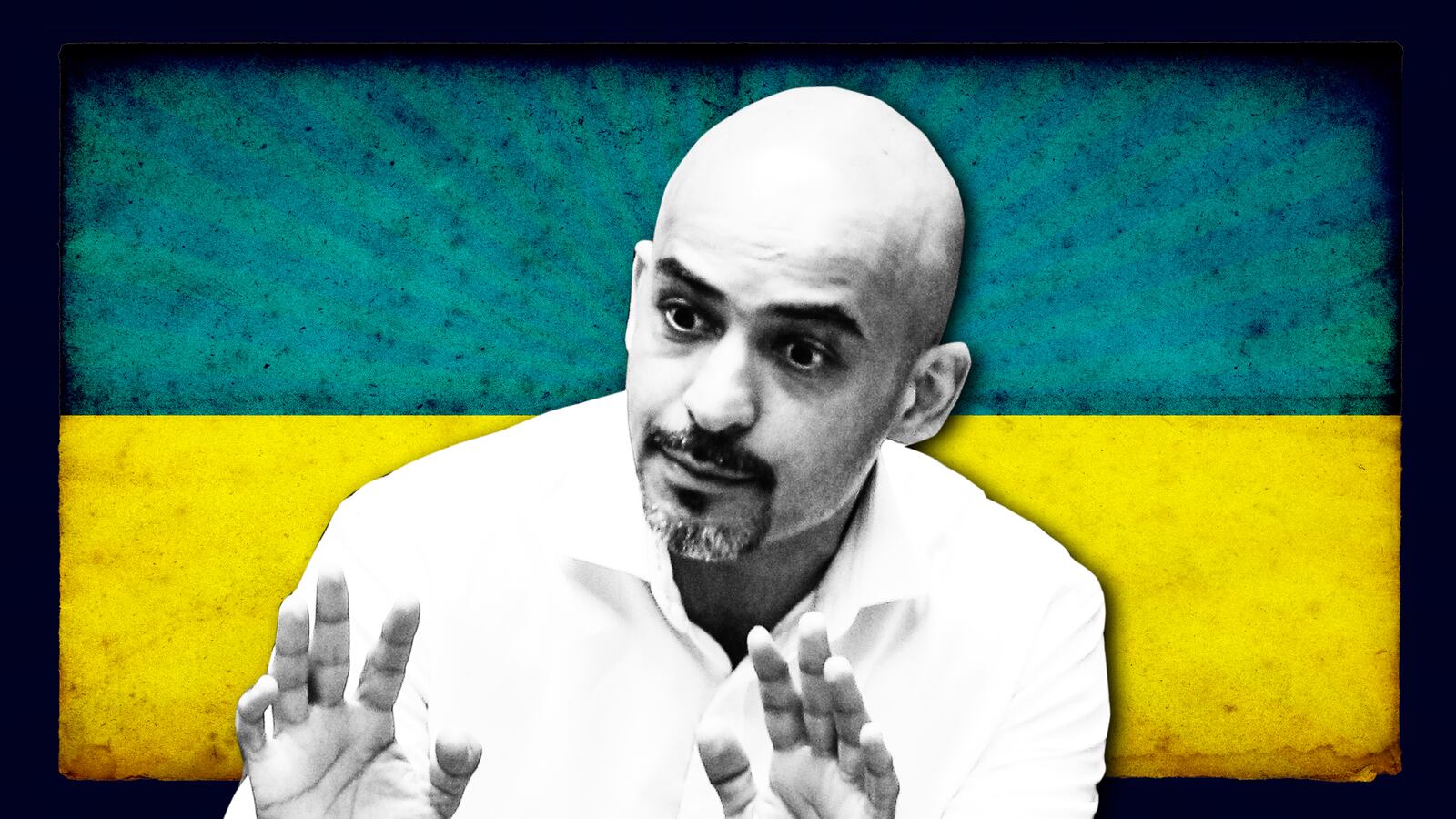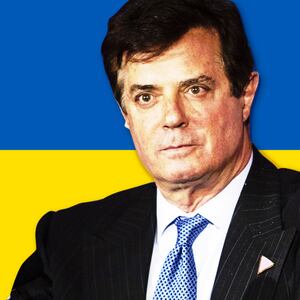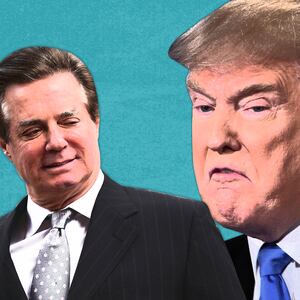KIEV—The man often called the father of Ukraine’s revolution, Mustafa Nayyem, has seen up close the way the hopes of young, passionate reformers can be thwarted by the forces of an old and corrupt system—a dilemma that faces movements for change across the world right now. And Nayyem is angry. In Ukraine he sees the past slithering back into the present like the many-headed hydra of old, lethal to some and poisoning the atmosphere all around.
Maidan activists, civil groups, and government critics across the country are facing a series of ugly, sometimes murderous attacks, while President Petro Poroshenko, who came to power with the help of civil society, is letting investigations languish, Nayyem told The Daily Beast. “President Poroshenko has done everything to become an enemy of civil society,” said the 37-year-old politician.
Nayyem is in some respects an anomaly. He was born in Kabul. He moved to Kiev as a child in 1990 together with his father, the former deputy education minister of Afghanistan under the defeated Soviet-backed regime.
Before plunging into the tumult of Ukrainian politics, Nayyem was a well-known investigative journalist. Three years ago he founded a group of “Euro-optimists” together with 23 other parliament members.
The group does not have wide popular support, but Nayyem is nonetheless one of the leading critical voices in the country, and the “Euro-optimists” represent much of what Maidan was about: liberal values, the fight against corruption, an end to impunity for criminal officials, integration with the European Union.
They are prominent on social media and political talk shows, but their voices have been drowned out in a parliament that is still dominated by deputies who like to do things the old way.
Nayyem waved his hand in frustration. He might be a “Euro-optimist,” but when it comes to the presidential elections scheduled for March next year, he has no optimism left. He is not going to run. He finds it ironic that his own generation of Maidan activists, those risking their freedom and their lives on Independence Square during the revolution, do not have anyone to vote for.
As things stand right now, the leading candidates are former Prime Minister Yulia Tymoshenko, with around 21 percent support, and President Poroshenko with about 11 percent popularity. Both represent the old corrupt system created with the help of Donald Trump’s former campaign manager, Paul Manafort, and it's indicative of the political environment that, earlier this year, Ukraine froze its investigation into Manafort’s alleged corruption here.
The Poroshenko government has begun to prepare a “foreign agent” bill analogous to the law pushed through by Russian President Vladimir Putin which targets NGOs, journalists and activists in Russia. It seems that the president has no power left to control far-right activists.
Supporters of the far-right movements Tradition and Order, Katerhon, Karpatska Sich, Right Sector and Monolit attacked trans activists during a peaceful transgender march on Sunday. Michael Colborne, a Canadian journalist covering the march, got punched in the face.
Nearly every one of at least 55 activists, journalists and politicians attacked here in recent months spoke about concrete cases of massive corruption, of police lawlessness, of political elite dragging Ukraine back to where it stood five years ago.
“We see how troll factories destroy the reputation of independent activists; we see prosecutors who do not investigate attacks on the activists, and security services, and intelligence following journalists and activists,” Nayyem said.
Five years ago this month, Nayyem appealed to “those who are ready” to join the protest on Maidan. It happened after the then-president of Ukraine, Victor Yanukovych, pulled out of an agreement with European Union. First thousands, then millions of Ukrainians joined the movement all across the country.
Three months later President Yanukovych, along with many of his ruling Party of the Regions, fled the country.
For the most part they went to Russia under the wing of Putin, who had been their patron. Then Putin retaliated against the pro-Western, pro-European Maidan revolution by seizing and annexing Ukraine’s Crimean peninsula and supporting a war in Donbas, eastern Ukraine, that continues to this day.
For years the Kremlin and Russian state TV shows denied Russian military forces were on the ground in Donbas, backing up the rebel movement. To make soldiers’ “peacetime deaths” secret, Putin signed a special decree in 2015. And before that Putin said that there were “no special forces, no instructors” in Donbas. But something changed on Thursday last week, when a TV host on Russia’s “60 minutes,” one of the most popular talk-shows, admitted out of the blue: “Of course our special services are there, it would be stupid to deny that.”
Even in Kiev, Russian influence did not end—and is making a conspicuous comeback.
Earlier this month a billboard with the long-forgotten name of Yanukovych’s political organization, “The Party of the Regions,” appeared just a few steps away from Independence Square in Ukraine’s capital. It said in Russian: “We’ll bring our people back.” More billboards advertised other for other pro-Russian parties and political groups.
After years in Ukraine’s opposition investigating such matters, Nayyem claims he knows exactly how much money those creeping back toward power spent on their campaign: $10 million to put billboards around the streets, at least $50 million to run the campaign, and even more to win it, he said. “Russia is pouring millions of dollars in,” he said, although The Daily Beast was not able to confirm those numbers independently.
A key figure emerging as a political player in Ukraine is Viktor Medvedchuk, says Nayyem, and it is hard to imagine stronger ties with the Kremlin than he has: Putin is the godfather of Medvedchuk’s daughter, Darina.
“Once again Ukraine is facing a huge threat: politicians affiliated with the old power, led by Medvedchuk, are rising again,” Nayyem told The Daily Beast. “President Poroshenko allows the pro-Russian powers to revive the old ruling Party of the Regions. If we don’t stop them, they will take control of the security services, executive power, win up to 100 parliament seats next October and destroy the agenda we had on Maidan.”
Ukrainian civil society has showed a passionate determination to survive the battles of the last five years. But the opposition has not been able to comprehend Putin’s buddy Medvedchuk entering Ukraine’s politics by joining the Russia-friendly For Life party. President Poroshenko, Ukraine’s commander-in-chief whose troops have been fighting the war with Russian-backed forces in Donbas for five years, which is in its fifth year, is doing little or nothing to stop Putin’s buddy Medvedchuk—who insists this is a “civil war”—from coming to power.
Medvedchuk was sanctioned by the U.S. Department of the Treasury for "violating Ukrainian sovereignty" by backing the Kremlin in Russia’s conflict with Kiev. But that did not stop him from becoming an intermediary between Moscow and Kiev at the Minsk ceasefire talks in 2015.
Nayyem’s answer in these turbulent times is to work with his fellow “euro-optimist” friends to try to create a new political power. “This time we don’t need a revolution, we need evolution,” Nayyem said.







